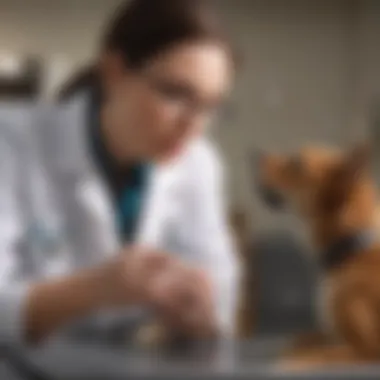Understanding Sudden Diarrhea: Causes and Considerations


Intro
Sudden diarrhea in pets is a condition that demands immediate attention from pet owners. It can be a signal of various underlying issues, ranging from mild digestive disturbances to serious health problems. Understanding the whys and hows of this condition is crucial for timely intervention and effective management.
Understanding Your Pet
Pets are not all the same. Each animal has unique traits and needs that can influence their health, including their digestive systems. Some breeds may be predisposed to gastrointestinal issues due to their genetics.
Breed Traits
Different breeds have varied tolerances to certain foods and environments. For instance, breeds such as the German Shepherd and the Labrador Retriever are known to have sensitive stomachs. Recognizing these traits can help in preventing sudden diarrhea caused by dietary indiscrepancies.
Common Temperaments
A pet's temperament can also affect its overall health. High-strung or anxious pets may experience stress, leading to digestive issues. Creating a calm environment is essential for these pets to maintain a healthy digestive tract.
Special Needs
Some pets may have special dietary or medical needs. If your pet has been diagnosed with conditions such as pancreatitis, discussing specific dietary guidelines with a veterinarian is important. Sudden deviations from their prescribed diet can lead to episodes of diarrhea.
Pet Care Essentials
The foundation of a pet's health lies in proper care. Nutrition, grooming, and routine health checks can prevent many health issues, including sudden diarrhea.
Nutrition and Feeding Guidelines
Providing a balanced diet is key. Understand what foods are appropriate for your pet based on its age, breed, and health status. Avoid sudden changes in diet, as this can disturb the digestive system.
Grooming Tips and Techniques
Regular grooming helps maintain skin health. Skin irritations or infections can sometimes lead to digestive issues. Keep your pet clean and inspect its skin for any abnormalities regularly.
Health and Wellness
Regular veterinary visits can help catch potential health problems early. Vaccinations, parasite control, and routine check-ups are essential to avoid complications that may lead to diarrhea.
Training and Behavior
Unruly pets might experience stress or anxiety that contributes to digestive problems. Effective training can enhance their overall behavior and health.
Basic Training Techniques
Teaching basic commands helps establish a routine and reduces anxiety. Engaging in regular training sessions can also provide mental stimulation.
Behavioral Problems and Solutions
Identify any behavioral problems that can lead to stress. For instance, excessive barking or destructive behavior can indicate anxiety. Addressing these through behavioral training can promote a better state of health.
Mental Stimulation Activities
Providing toys and activities that stimulate your pet’s mind is important. Bored pets may develop destructive habits that can lead to stress and digestive disturbances.
Engaging with Your Pet
Interaction is crucial for a pet's emotional and physical well-being. Activities not only strengthen the bond between pet and owner but also contribute to a healthier lifestyle.
Interactive Games and Toys
Investing in puzzle toys or training games can help keep your pet occupied and mentally active. A stimulated pet is less likely to experience issues stemming from boredom or anxiety.
Safe Outdoor Activities
Taking your pet for regular walks or allowing playtime in a secure area promotes good physical health. Exercise helps maintain a healthy digestive system, reducing the risk of diarrhea.


Family-Friendly Pet Interactions
Encouraging all family members to engage with the pet can provide a more stable environment. A well-adjusted and happy pet is less likely to experience stress-related health issues.
Pet Adoption and Integration
When adopting a new pet, various factors should be considered to avoid future health dilemmas.
Choosing the Right Pet for Your Lifestyle
Assess your lifestyle to ensure you choose a pet that can adapt. Some breeds require more attention, exercise, and medical care than others.
Preparing Your Home for a New Pet
Ensure your environment is safe and accommodating for a new pet. Take time to remove potential hazards and create a space where the pet can feel secure.
Tips for Smooth Intro
Introduce the new pet to family and existing pets gradually. A slow acclimatization process can help reduce anxiety, supporting overall health in the long run.
Understanding these various aspects of pet care can significantly improve your pet's health, particularly in managing sudden diarrhea.
In summary, recognizing potential triggers and understanding your pet's unique characteristics are key to better health management. By implementing effective dietary and care practices, reinforcing training, and ensuring positive interactions, the risk of sudden diarrhea can be minimized.
Overview of Sudden Diarrhea
Sudden diarrhea is a critical topic that pet owners must understand. It can be distressing for both pets and their owners. This article aims to shed light on the various causes and considerations related to this condition. By grasping the basics of sudden diarrhea, pet owners can make well-informed decisions regarding the care and health of their furry companions.
Definition of Sudden Diarrhea
Sudden diarrhea refers to the rapid onset of frequent, loose, or watery stools in pets. This condition can arise unexpectedly and may last for a short period. Unlike regular diarrhea, which can develop gradually, sudden diarrhea typically occurs swiftly and can be alarming. It is often accompanied by other symptoms such as vomiting, lethargy, or change in appetite.
Importance of Understanding the Condition
Recognizing sudden diarrhea is crucial for timely intervention. Understanding this condition enables owners to observe their pets closely and identify potential risks.
- This knowledge helps distinguish between mild cases that may resolve on their own and severe situations that require veterinary attention.
- Being aware of the potential causes, such as dietary changes or infections, can aid in prevention as well.
- Furthermore, a good understanding simplifies the process of managing the condition when it occurs, ensuring pets receive appropriate care quickly.
Understanding sudden diarrhea is not only essential for pet health but also vital for ensuring comfort and well-being of the animal during distressing times.
Common Causes of Sudden Diarrhea
Understanding the common causes of sudden diarrhea is critical for pet owners. This section outlines how various factors substantially increase the risk of this gastrointestinal disturbance. Identifying these causes aids in faster response times to the issue. A timely reaction can often prevent more severe health concerns, ensuring that pets receive appropriate care when needed.
Dietary Changes and Sensitivities
Dietary alterations are among the primary contributors to sudden diarrhea in pets. Pets can experience gastrointestinal distress from abrupt shifts in their diet. For example, introducing new foods too quickly can upset their digestive systems. Additionally, some pets may have sensitivities or intolerances to certain ingredients, leading to uncomfortable symptoms. Ingredients such as dairy, gluten, or specific proteins can be problematic for some animals. Owners should make dietary changes gradually and monitor their pet's reactions closely to identify any potential sensitivities.
Bacterial Infections
Bacterial infections are another prominent cause of sudden diarrhea. Common culprits include bacteria like Salmonella, E. coli, or Campylobacter. These pathogens can contaminate food or water, leading to gastrointestinal upset in pets. Pets may ingest bacteria from various sources, including undercooked food or unsanitary living conditions. Symptoms often appear quickly, necessitating vigilance from pet owners to ensure proper hygiene and prevent infection. Avoiding raw food diets can also reduce the risk of these infections.
Viral Infections
Viral infections can also trigger sudden bouts of diarrhea. Viruses such as the canine parvovirus or feline panleukopenia are notable examples. These infections often spread easily among animals, placing pets at risk during socializing or when visiting crowded environments, like boarding facilities. Symptoms may range from mild to severe and usually require veterinary intervention. Vaccination plays a significant role in prevention. Keeping up with recommended shots can help safeguard pets against these harmful viruses.
Parasites and Infestations
Parasites, including worms and protozoa, can lead to sudden diarrhea. Common parasites affecting pets include Giardia, Coccidia, and various types of roundworms or tapeworms. These parasites often enter the pet's system through contaminated food, water, or contact with infected animals. Symptoms of infestation, such as diarrhea, weight loss, or bloating, can be distressing for both pets and owners alike. Regular veterinary check-ups and stool examinations can help detect and manage these parasite-related issues effectively.
Key Takeaway: Understanding these causes is essential for monitoring and maintaining your pet's health. Immediate action can prevent complications and alleviate discomfort.
Less Common Causes of Sudden Diarrhea
Understanding the less common causes of sudden diarrhea is crucial for pet owners. While many reasons for these gastrointestinal issues are well-known, the rarer causes can be equally significant. Identifying these causes can lead to appropriate treatment and prompt recovery. Moreover, recognizing less apparent triggers can guide pet owners in managing their pets' diets and integrating preventive measures. This knowledge helps form a complete picture of your pet's health.


Food Intolerance and Allergies
Food intolerances and allergies can trigger sudden diarrhea in pets. These conditions occur when the pet's digestive system reacts poorly to certain ingredients, causing inflammation. It's often difficult to pinpoint specific food items without proper observation. Signs may include excessive gas, itching, or skin irritations. Knowing your pet's sensitivities is vital. If a certain food repeatedly causes digestive distress, it should be eliminated from the diet.
Medication Side Effects
Another less common cause includes medication side effects. Various drugs can disturb the digestive system. Nonsteroidal anti-inflammatory drugs (NSAIDs) and certain antibiotics, for instance, may upset the balance of gut bacteria, leading to diarrhea. If your pet starts experiencing gastrointestinal issues after beginning a new medication, consult your vet. They can assess whether the medication is the culprit and suggest alternatives if necessary.
Underlying Health Conditions
Underlying health conditions may also contribute to sudden diarrhea. Understanding these conditions helps in addressing the issue effectively.
Gastrointestinal Disorders
Gastrointestinal disorders, such as inflammatory bowel disease, can significantly impact a pet's digestive health. These disorders result in persistent inflammation, leading to various symptoms, including sudden diarrhea. A key characteristic of gastrointestinal disorders is their complexity. They often require a thorough diagnostic approach, including endoscopies or biopsy, to establish a precise diagnosis. Once identified, managing the disorder becomes the focal point of treatment. Thorough management tends to improve the pet's quality of life.
Endocrine Disorders
Endocrine disorders, like hyperthyroidism or diabetes, also play a role in sudden diarrhea. These disorders disrupt normal body functions, which can lead to gastrointestinal disturbances. A key feature is the overarching effect of these disorders on metabolism and digestion. Recognizing the link between an endocrine disorder and sudden diarrhea can facilitate more focused treatment plans. Treatment may involve hormone replacement or medication to regulate the endocrine system. Managing these disorders often requires a collaborative approach between pet owners and veterinarians to ensure the best care.
The connection between health conditions and sudden diarrhea emphasizes the need for regular veterinary check-ups. Monitoring your pet's overall health can help in early detection of these less common causes.
Identifying Sudden Diarrhea in Pets
Identifying sudden diarrhea in pets is crucial for several reasons. First, timely recognition of symptoms can lead to faster intervention, which can be vital in preventing dehydration and other health complications. Second, understanding the specific signs your pet exhibits can help you distinguish between a mild issue and a potentially severe medical condition that warrants veterinary attention. Observant pet owners can manage their pet's health more effectively when they know what to look for.
Symptoms Associated with Diarrhea
Monitoring the symptoms associated with diarrhea is vital in assessing your pet's condition accurately. These symptoms can vary but generally include stool consistency, frequency of bowel movements, and accompanying signs of illness. Each of these elements provides insights into the underlying cause of the diarrhea and guides your response.
Consistency of Stool
The consistency of stool is a critical factor in diagnosing the severity of diarrhea in pets. A healthy stool should be firm and well-formed; however, diarrhea may present as watery, loose, or even bloody stools. Watery stool, in particular, signals an issue that cannot be ignored, as it may lead to rapid fluid loss and dehydration.
Key Characteristic: The primary characteristic to note is the transition from normal to abnormal consistency. Regularly observing your pet's stool can help you identify any deviations promptly.
Unique Feature: The change in stool consistency reflects the body's response to an inflammatory state or infection. This aspect is advantageous for this article, as changes in consistency can help point toward specific underlying causes.
Frequency of Bowel Movements
Frequency of bowel movements is another important symptom to consider. Normal frequency varies by pet; however, an increase in urgency and frequency can indicate that a gastrointestinal disturbance is present. For example, if your dog usually defecates twice a day and suddenly has eight loose stools, this could indicate sudden diarrhea needing attention.
Key Characteristic: The distinction between regular frequency and increased bowel movements is crucial. A pet’s typical routine can set a baseline for observed changes.
Unique Feature: Increased frequency provides insight into how the gastrointestinal system is working. This detail can also alert owners to other symptoms and conditions related to sudden diarrhea.
Accompanying Signs of Illness
Accompanying signs of illness may include vomiting, lethargy, or loss of appetite. These additional symptoms can signify more serious issues that extend beyond simple gastrointestinal upset. Monitoring for these signs is essential in determining the overall health of your pet.
Key Characteristic: These signs often reflect the broader impact of diarrhea on the pet's health. Attention to these details is necessary for a comprehensive assessment.
Unique Feature: The presence of accompanying signs enhances our understanding of the condition. Observing this can influence when to seek veterinary advice, thereby ensuring timely care for the affected pet.
When to Seek Veterinary Care
Recognizing when to seek veterinary care is critical. If diarrhea persists for more than a day or is accompanied by significant changes in your pet's behavior, immediate attention is required. Symptoms such as bloody stool, high fever, or extreme lethargy should always prompt a vet visit. Knowing when to act can be invaluable for your pet's recovery. This proactive approach ensures that any underlying problems receive the attention they deserve.
Management Strategies for Sudden Diarrhea
Understanding how to manage sudden diarrhea is crucial for pet owners. Quick and appropriate responses can make a significant difference in your pet's well-being. Managing this condition effectively involves a combination of dietary adjustments, hydration considerations, and appropriate use of over-the-counter treatments. Each strategy plays an integral role in promoting recovery and ensuring the comfort of your pet.
Dietary Adjustments
Modifying your pet's diet can relieve sudden diarrhea. Often, foods can irritate the gastrointestinal tract, exacerbating symptoms. It's essential to shift to a bland diet temporarily. Foods such as plain boiled chicken, rice, or pumpkin can help settle the stomach. Avoid fatty, spicy, or rich foods during this time. Gradually introduce regular food back into their diet once diarrhea subsides.


Consider choosing a high-quality pet food that includes prebiotics and probiotics. These ingredients help establish healthy gut flora, which can be beneficial in preemptively avoiding future disturbances.
Hydration Considerations
Diarrhea can lead to dehydration, which is a serious concern for pets. Ensuring that your pet has constant access to fresh and clean water is vital. Monitor their water intake closely. If your pet is reluctant to drink, try offering ice chips or ice cubes. Electrolyte solutions designed for pets can also be helpful. They contain essential minerals that support hydration balance.
If diarrhea persists for more than 24 hours, consult a veterinarian. Dehydration can escalate quickly and may require medical intervention.
Over-the-Counter Treatments
There are several over-the-counter options available that can assist in managing diarrhea. Medications like loperamide can be effective, but they are more suited for short-term relief. Always consult your veterinarian before administering any medication.
Additionally, probiotic supplements can help in managing gastrointestinal health. They encourage a balanced gut microbiome and may hasten recovery. Never self-prescribe any medications without professional guidance, as some may not be suitable for all pets.
Proper management of sudden diarrhea can expedite recovery and improve your pet's quality of life.
In summary, adopting a structured approach to managing sudden diarrhea through dietary adjustments, hydration considerations, and cautious use of over-the-counter treatments can provide both relief and recovery for your pet. Remember to keep a close eye on symptoms and seek veterinarian advice when necessary.
Preventive Measures
Preventive measures play a crucial role in managing sudden diarrhea in pets. Being proactive can significantly reduce the risk of gastrointestinal upset and subsequent health issues. Understanding the various preventive strategies helps pet owners make informed choices for their furry companions, ensuring a healthier lifestyle and fewer medical worries.
Understanding Food Labels
Food safety and quality are vital aspects of pet health. When selecting pet food, it is critical to read and understand food labels. Labels provide essential information about the ingredients and nutritional value of the food. Pet owners should look for specific details that indicate high-quality nutrition. This includes:
- Ingredient List: The first five ingredients should be high-quality proteins followed by vegetables or whole grains. Avoid foods with vague terms like
Monitoring Recovery from Diarrhea
Managing your pet's health is a responsibility that requires attention, especially in cases of sudden diarrhea. Monitoring recovery from diarrhea is crucial for several reasons. First, it allows pet owners to assess the severity of the condition over time. Diarrhea can lead to dehydration and nutrient loss, which may quickly escalate to serious health issues if left unchecked. Knowing how to monitor your pet effectively aids in distinguishing between a normal recovery process and a developing complication.
Tracking recovery also provides valuable insight into whether your pet's dietary adjustments and hydration strategies are effective. Observing changes in symptoms such as stool consistency, frequency of bowel movements, and any accompanying signs of illness helps you make informed decisions about potential veterinary involvement.
Additionally, paying attention to your pet’s behavior during recovery can reveal underlying issues that may warrant further investigation. Animals cannot communicate discomfort in the same way humans can. Therefore, consistently evaluating their condition allows for early detection of possible complications.
Tracking Symptoms
Understanding how to track symptoms is essential to ensure your pet recovers properly from diarrhea. Begin by monitoring stool consistency. Normal stool should be firm and not too dry or too watery. You should note any changes in appearance or smell. This offers concrete data about your pet's health.
Next, keep an eye on the frequency of bowel movements. An increase in frequency can indicate a persistent issue, while a decrease could signal recovery. Look for any additional symptoms such as vomiting, lethargy, or signs of pain. Keeping a log of these observations is beneficial.
You may also consider using a simple checklist:
- Stool consistency (normal, loose, watery)
- Frequency of bowel movements (number per day)
- Accompanying symptoms (vomiting, lethargy)
- General behavior (active, withdrawn, normal)
Using this method can help you articulate specific concerns should you need to contact your veterinarian, enhancing the clarity of your observations.
Reintroduction of Regular Diet
Once your pet shows signs of improvement, gradually reintroducing a regular diet can be a delicate process. Start with bland foods such as boiled rice or plain chicken to ease the transition. Gently mix small amounts of the regular diet with the bland food. Doing this slowly helps the digestive system adjust without overwhelming it.
Observe your pet closely during this phase. If any adverse reactions occur, such as a return of diarrhea, it may be necessary to revert to bland food for a little longer before trying again. This cautious approach allows for a seamless transition back to regular meals while minimizing stress on the digestive system.
It is also important to consult your veterinarian for guidelines on specific brands or types of food that are suitable for your pet's condition. You might need to avoid potential allergens or irritants based on previous experience.
In summary, monitoring recovery from diarrhea is empty essential for ensuring your pet's well-being. Regular assessment of symptoms and a careful approach to diet reintroduction helps maintain health and ensures the digestive system can cope with the return to normalcy.
Epilogue
Understanding sudden diarrhea is vital for every pet owner. The implications of this condition extend beyond mere inconvenience; they can signify underlying health issues that require prompt attention. This article emphasizes the various causes, including dietary changes, infections, and other health conditions. Acknowledging these factors allows for better decision-making regarding pet health.
Summary of Key Points
- Detection of Sudden Diarrhea: Recognizing the signs and understanding when it is a cause for concern helps in timely intervention.
- Possible Causes: An array of potential issues may lead to sudden diarrhea. Diet, infections, and health disorders are pivotal factors.
- Management Strategies: The article outlines practical approaches for managing the condition, focusing on hydration and dietary adjustments.
- Preventive Actions: Learning to read food labels and regular veterinary check-ups can play a crucial role in preventing sudden diarrhea.
"The health of our pets is closely linked to our knowledge and awareness of their needs."
Final Thoughts on Pet Health
The health of pets should always be a priority. Sudden diarrhea, while often temporary, can indicate significant concerns. Awareness of what contributes to this condition is essential. Engaging in preventive measures, monitor symptoms, and being prepared to act can lead to better outcomes. Pet owners should feel empowered with information, enabling them to make informed choices that enhance the well-being of their furry companions.



